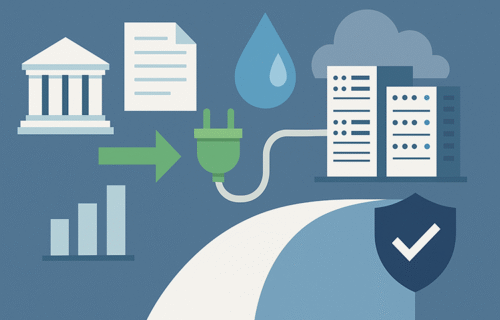The UK Government has published a new policy paper, Data Centres: Planning Policy, Sustainability and Resilience, outlining the future direction for the development of the sector. The paper follows the 2024 decision to designate data centres as part of the UK’s Critical National Infrastructure (CNI), a move with significant regulatory and planning implications.
The government notes that data centres are central to the digital economy, supporting online services, cloud computing, financial markets, and emerging technologies such as artificial intelligence. The UK had about 450 data centres in 2024, with a combined capacity of 1.6 GW. Capacity is forecast to rise to between 3.3 GW and 6.3 GW by 2030. While most are concentrated in Greater London, new hubs are developing in Manchester and South Wales.
According to the report, data centres contributed £4.7 billion annually in gross value added to the UK economy and supported around 43,500 full-time jobs, mainly in operations, construction, and supply chains. The sector is also identified as a key part of the government’s AI Growth Zones programme, designed to foster clusters of research and innovation.
Planning Policy and Infrastructure
Recent updates to the National Planning Policy Framework (NPPF) require local planning authorities to consider the specific needs of data centres when preparing local plans and deciding applications. AI Growth Zones will benefit from streamlined approvals and infrastructure support. Data centres will also be able to opt into the Nationally Significant Infrastructure Projects (NSIP) regime, with applications decided directly by the Secretary of State.
Sustainability Challenges
The paper highlights concerns over energy use. Data centres currently consume about 2.5% of UK electricity, a figure expected to quadruple by 2030. To address this, the government has reformed the grid connection process to prioritise clean energy projects and is encouraging operators to use renewable sources through power purchase agreements. The newly formed AI Energy Council will help align AI and energy sector needs.
Water use is also identified as a challenge. The government is working with industry and the Environment Agency to improve transparency on water consumption, promote efficiency, and ensure sufficient supply for new facilities. Applications for AI Growth Zones will need confirmation from local water suppliers that demand can be met.
Resilience and Security
As part of the CNI designation, data centres will have enhanced access to government support in the event of threats or emergencies, including coordination with the National Cyber Security Centre. The forthcoming Cyber Resilience Bill will extend statutory cybersecurity duties to the sector. Operators are also encouraged to adopt standards such as EN 50600, ISO 27001, and BREEAM resilience criteria.
Balancing Growth and Risk
The government acknowledges the importance of data centres for economic growth and digital innovation, but also emphasises the need to balance expansion with environmental and security considerations. The policy aims to ensure that as the sector grows, it remains sustainable, resilient, and aligned with national priorities for clean energy and net-zero emissions.
Source: CMS
